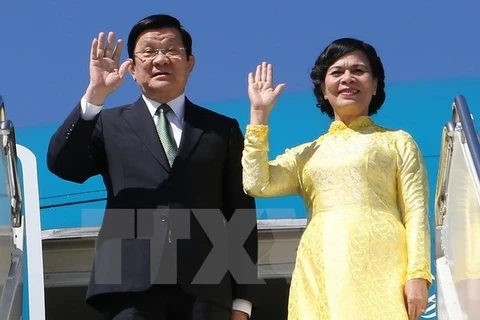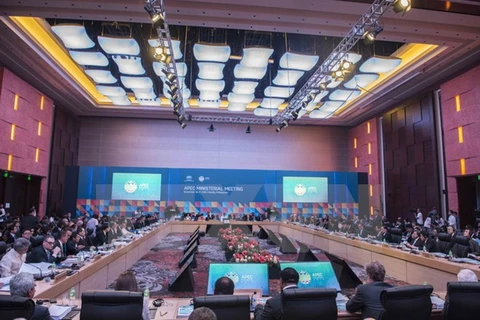Manila (VNA) – The 27th Asia-Pacific Economic Cooperation (APEC) Ministerial Meeting wrapped up in Manila, the Philippines, on November 17 after two working days under the theme “Inclusive Growth through Sustainable and Resilient Communities”.
Foreign and economic/trade ministers of the 21 member economies discussed measures boosting APEC cooperation in coping with challenges to the promotion of inclusive growth. They stressed that the forum needs to implement concrete programmes and projects and work together to maintain regional peace, stability, prosperity and development.
In particular, APEC should focus on enhancing collaboration in climate change response, disaster risk mitigation, energy and food security, agricultural cooperation, environmental protection, urbanisation, and human resources development. The member economies also need to pay more heed to vulnerable groups such as women, persons with disabilities and the elderly.
The ministers agreed to step up sharing experience in and information about anti-terrorism within APEC in the wake of a series of recent attacks in France’s Paris.
At the meeting, Deputy Prime Minister and Foreign Minister Pham Binh Minh noted that complex developments continued in the region and the world this year. However, the regional and international communities have gained new momentums for and renewed trust in trends towards cooperation, connectivity and sustainable development.
He highlighted that the United Nations member countries approved the 2030 Agenda for Sustainable Development and are working towards a new global agreement aimed to cope with climate change that is hoped to be reached at a conference this December. Additionally, the Asian-Pacific region has also taken the lead in global growth and economic connectivity.
He emphasised that APEC needs to boost inclusive growth in association with building sustainable and resilient communities that centre on people.
The forum’s members should prioritise strengthening ties to eliminate poverty; narrow the development gap; ensure food, water and energy security; respond to natural disasters; and conduct search and rescue, Minh added.
The Vietnamese official suggested them foster economic and technical cooperation to help improve the developing economies’ capacity while reinforcing affiliation in education, vocational training, health care and women empowerment.
He asked APEC to continue bringing into play its role as the driving force for regional growth and economic connectivity through assisting initiatives linking sub-regions, and advocating Greater Mekong Sub-region cooperation programmes and the ASEAN Community’s centrality.
At the APEC Ministerial Meeting, participants also completed preparations for the 23rd APEC Economic Leaders’ Meeting, scheduled to begin on November 18.
The APEC forum is one of the leading multilateral cooperation mechanisms in the region as well as to Vietnam. The country joined APEC in November 1998 and successfully hosted APEC events in 2006. It will once again organise APEC meetings in 2017 and is actively gearing up for the activities.-VNA

























